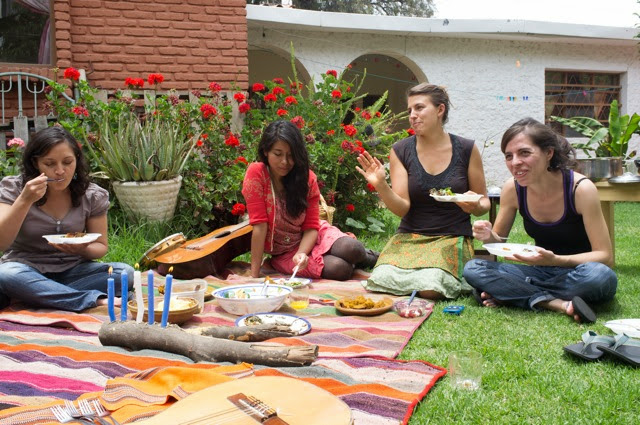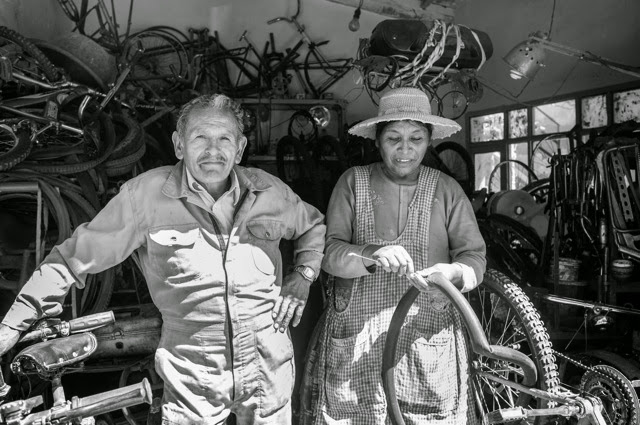 |
| A mild-tempered, "cute, sweet" blockade--that's to say nothing compared to the 10 miles of stacked semi-trucks we had to pass through (on foot and on various motorcycles) the following day at dusk. |
 |
| Me, preparing with two student volunteers for a workshop at Kusikuna, the alternative school where I currently work. Cochabamba's foothills behind. |
The everyday is just that: everyday. It's getting up at dawn when it's cold (it's winter now) and lonely (my roommates still sleeping). I make my tea and fruit with yogurt which—refusing to anxiously scarf down breakfast in the morning rush—I take with me. Sleepily I wonder why am I doing this?, feeling alone and unconvinced that my efforts make a difference. I load up my backpack with my computer, materials for my workshops or classes, my breakfast (and sometimes lunch), water and tea, and hop on my bike. I ride north ten minutes toward the mountain range (a bit of morning grace) bordering the north of Cochabamba. I park my bike by the produce stand (hoping, once again, the bike won't get stolen), and say good morning to the Casera who is uncovering fruits and vegetables for the day's work. I wait at the corner of Rene Moreno and America for my school van – then, a 40 minute ride to the rural alternative school where I work. I teach classes, or I meet with the principal and other teachers. I feel confused and lost, or/and excited and proud. I come home absolutely exhausted. [You can read a slightly glowier description of my school here, a document I recently wrote to help promote the school and fundraise.]
 |
| Teaching groups of students at a Book Fair in Sucre (Followed by blockades in the attempted return to Cocha) |
On Wednesdays and Fridays I'm luckier. Sometimes I sleep in (recovery from the other days). Sometimes a morning run to the campo with Becky to salute the cows. We pass by my favorite Tiquipaya farms, savoring the fresh morning air, the endorphins, and the views broccoli, potatoes and the once-green mountains. After a shower and (more-relaxed) breakfast there may be a mid-week rehearsal, singing classes to teach, contracted translation work, lesson planning, shopping, cleaning, errands, or –well, I'm not really sure – life stuff. I might share a much-longed for cup of coffee with a friend, make a meal with my roommates, write a letter home, or try to pray. I try to keep it productive yet restful – try to avoid another Wednesday afternoon cry because I'm so tired or frustrated or demoralized from pondering my "purpose" in life (or lack there of), or from going to the immigration office in vain once again. I try to sink into that freedom of being less important and more grateful, which Bolivia has taught me, letting go of the great American illusion pumped into us that we are the greatest and the key to saving the world. I'm one of seven billion people; let gratitude and simple integrity suffice for today.
 |
| An afternoon delight: a garden work date with Becky & Alder at my house |
Adventure here is not always as charming as it sounds – though, as a friend of mine says "It's not really an adventure unless you want to be home while it's happening." The 33 hour detours, the amoebas and diarrhea, the robberies, getting stung and bitten, the endless bureaucracy, the Bolivian concept of "on time" -- could all be called part of "the Bolivia adventure experience." Or, we could call them hassles that complicate life and exhaust you. The "adventures" I enjoy most are the small things: the everyday. It's the adventure of joking with the women at the market, the adventure of talking with my boss--dreaming about the future of our school or hearing him tell stories about Bolivia, the adventure of the big communal meals we cook in our kitchen or a surprise afternoon coffee, it's the adventure of a lazy breakfast with my roommates, the adventure of the music or story-telling circles that often accompany a dinner party, the adventure of my regular runs to the countryside. These are the little adventures that make life sweet and bearable. They are the words of Solomon in the Jewish scriptures that ring true across time and cultures and continents: "So, I decided there is nothing better than to enjoy food and drink and to find satisfaction in work. Then I realized these pleasures are from the hand of God." (Ecc 2:24) No matter the futility, vanity or frustration of the days, simple sweetness and gratitude can be found in the un-adventurous adventure of the everyday.
 |
| The delights of everyday. Cooking dinner for my roommate's 30th birthday |
Amidst the intensity of these recent weeks laden with saying goodbyes, interviewing for new work, contracting new roommates, getting robbed, getting stuck in blockades (again), I also bought my first flight home. On September 9th I arrive on American soil. I turned down the job offer with the study abroad program as an act of faith—following my gut instinct that I need to be home this fall. On December 5th I will return to Bolivia (whether for the long-term or short-term I still do not know), but during the 89 days at home I will work, I will visit, I will reflect and reflect, I will take an EMT course, I will share numerous cups of coffee with people I dearly love and miss, I will try to make sense of the past year and a half in relation to the rest of my life, my community, my faith, and the modern globalized world in which we live.
I will be so, so excited to see you.
 |
| What we then called "crazy" but now call "adventure": preparing to board the "ferry" (2 large canoes nailed together by large planks) on our long blockade detour . |
































